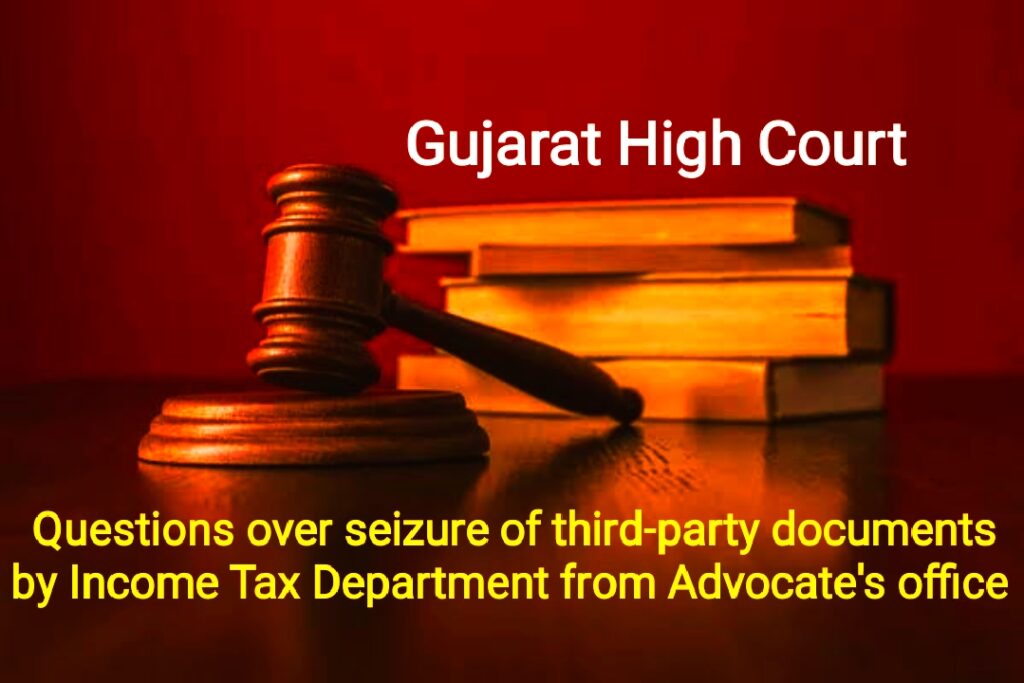The Court refused to accept the department’s undertaking on Seizure to seal Non-incriminating data and decided next Hearing on January 9
In a significant development, the Gujarat High Court has raised objections to the Income Tax department’s seizure of documents from a lawyer’s office, emphasizing concerns over the violation of fundamental rights. The division bench, consisting of Justices Bhargav Karia and Niral Mehta, refused to accept the department’s undertaking to seal “non-incriminating” data and has decided to hear the matter on its merits.
This legal saga began when the Income Tax department conducted a four-day search operation in November this year, seizing documents and materials from the office and residence of an advocate, who subsequently filed a petition alleging the infringement of his fundamental rights.
Concerns Over Conduct of Raid:
The bench expressed apprehensions about the manner in which the raid was conducted and raised objections specifically to the seizure of third-party related documents from the lawyer’s office. The Income Tax department countered these concerns by accusing the lawyer of engaging in unscrupulous practices and claimed to have seized incriminating material during the search.
Undertaking of Income Tax Department:
During the proceedings, Additional Solicitor General (ASG) N Venkataraman, representing the Income Tax department, submitted a written undertaking. In the document, the department assured that the seized digital data, extracted on a separate hard disk from the working copy, would be analysed on priority to identify incriminating data.
The incriminating data would then be separated, stored in a separate hard disk, and both the working copy and the extracted hard disk containing non-incriminating data would be permanently sealed. The sealing process would be conducted in the presence of the petitioner, and a four-week timeframe was suggested for completing the entire exercise.
Court’s Response and Suggestions:
Justice Bhargav Karia raised a crucial question about who decides what qualifies as incriminating or non-incriminating material. He proposed that the petitioner be involved in the analysis process or an independent person be present during the segregation of material. Justice Karia emphasized that the petitioner should be given assistance, including the presence of an advocate or an expert person during the evaluation of each document to ensure a fair and transparent process.
ASG Venkataraman’s Concerns:
In response to the court’s proposal, ASG Venkataraman expressed concerns that such conditions would obstruct the work of the Income Tax department. He argued that involving the petitioner in the analysis process effectively meant stonewalling a case that involved a significant seizure running into hundreds and thousands of crores.
Next Steps and Future Hearings:
The court has set the next hearing for January 9, where it will delve into the merits of the case law. This indicates that the judiciary is taking a comprehensive approach to address the alleged violation of fundamental rights and the contentious seizure of documents from the lawyer’s office.
Conclusion:
The ongoing legal battle between the advocate and the Income Tax department highlights the delicate balance between upholding fundamental rights and enabling law enforcement agencies to carry out their duties. The court’s insistence on a transparent and fair analysis process, involving the petitioner or an independent party, underscores the commitment to justice in this matter.
As the case progresses, it will undoubtedly set important precedents regarding the rights of individuals during such investigations and the responsibilities of government agencies in conducting searches and seizures.
To Access the CBDT Notification 104/2023 Dated 19 December 2023 CLICK HERE
READ MORE

